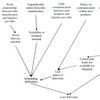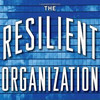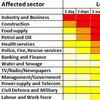 Critical Infrastructure. Which is more important – or ‘critical’ – road networks or computers? What if one day you could no longer use your computer or the Internet for one month, but you could still go anywhere by car? Or what if one day you could no longer go anywhere by car for one month, but you still had your computer or the Internet up and running, which would be worse? I would rather live without computers than without roads…
Critical Infrastructure. Which is more important – or ‘critical’ – road networks or computers? What if one day you could no longer use your computer or the Internet for one month, but you could still go anywhere by car? Or what if one day you could no longer go anywhere by car for one month, but you still had your computer or the Internet up and running, which would be worse? I would rather live without computers than without roads…
Critical Infrastructure Research
Research into Critical Infrastructure has attracted considerable interest during the last decade, particularly since 9/11, but already in the mid and late 1990s Critical Infrastructure established itself as research field. In Norway this is exemplified by the research project ‘Protection of Society’ (POS) or ‘Beskyttelse av Samfunnet’ (BAS, in Norwegian), undertaken by the Norwegian Defense Research Institute, FFI, in cooperation with the Norwegian Directorate for Civil Defence and Emergency Planning, DSB, and which published their first report in 1997. At that time I was an adviser with a regional emergency planning authority in Norway, and I remember reading their report with great interest.
Infrastructure Interdependencies
The objective of the first BAS project report was to describe how modern society will react to and can protect itself when facing modern warfare. In doing so, the report identified key components and functions that are essential to a modern society, and interdependencies between them. The figure below is taken from the report.
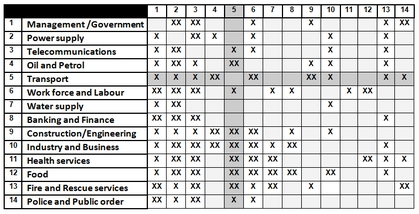
A cross along the column marks that this sector is necessary for the sector in the corresponding row.
A cross along the column marks that this sector is necessary for the sector in the corresponding row.
Transportation – you cannot do without it
In a later report, the BAS project looked closer at the importance of maintaining a well-functioning transportation infrastructure, and what impact transportation disruptions might have on the other important sectors of society. The figure below summarizes the findings.
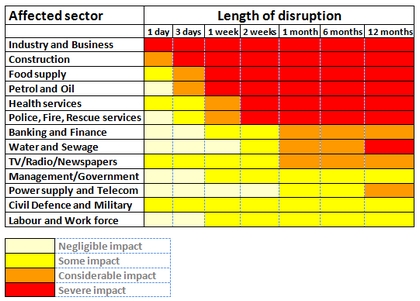
Unsurprisingly, transportation disruptions have the greatest impact in sectors dependent on the distribution of goods and supplies, just like the Germans sadly realized the importance of railways during WWII. Banking and finance appear to be unaffected by transportation disruptions. The question is, has the vulnerability changed since 2002, when this report was published? Are we now more dependent on computers than on roads? I dare say not. Roads are still more important for the basic needs of a community.
References
(unfortunately in Norwegian only)
Hæsken, O.M., Olsen, T.G., Fridheim, H. (1997) Beskyttelse av samfunnet (BAS): Sluttrapport. FFI/Rapport-1997/01459 (English: Protection of Society (POS): Final Report)
Rodal, S. K. (2002) Systembeskrivelse av norsk vegtransport. FFI/Rapport-2002/00807 (English: System description of the Norwegian road transport).
Hagen, J.M., Rodal, G.H., Hoff, E., Lia, B., Torp, J.E., Gulichsen, S. (2003) Beskyttelse av samfunnet med fokus på transportsektoren. FFI/RAPPORT-2003/00929 (English: Protecting the society, Focusing on the transport system).
Hoff, E. (2003) Samfunnsmessige konsekvenser ved transportsvikt. FFI/RAPPORT-2003/01409 (English: Consequences for society if transportation fails).
Downloads
(unfortunately in Norwegian only)
- FFI: Beskyttelse av samfunnet (BAS): Sluttrapport
(English: Protection of Society (POS): Final Report) - FFI: Systembeskrivelse av norsk vegtransport
(English: System description of the Norwegian road transport) - FFI: Beskyttelse av samfunned med fokus på transportsektoren
(English: Protecting the society, Focusing on the transport system) - FFI: Samfunnsmessige konsekvenser ved transportsvikt
(English: Consequences for society if transportation fails)
Links
- FFI: The Norwegian Defence Research Establishment
- NOU 2006.6: Sårbarhet i kritisk infrastruktur
- NTP: Transportnettets sårbarhet – Strategiske utredninger.
Related
- husdal.com: Supply chain Disruptions in Sparse Transportation Networks
- husdal.com: Engineering transportation lifelines
- husdal.com: Highway Vulnerability and Criticality Asssessment
- husdal.com: Infrastructure – necessary for competitiveness?

